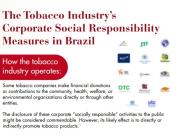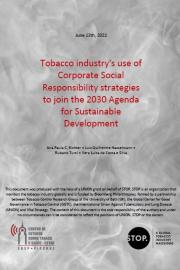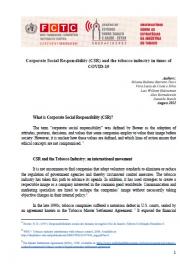
Some tobacco companies make financial donations or contributions to the community, health, welfare, or environmental organizations directly or through other entities. The disclosure of these corporate “socially responsible” activities to the public might be considered commendable. However, its likely effect is to directly or indirectly promote tobacco products.

This document consists of an analysis of publications on Agenda 2030 and IT CSR actions available for academic research (abstract, report, file, scientific article, review, monograph, etc.), available in traditional media (radio, television, newspapers, pamphlets , etc) and available on digital media (social networks, blogs, YouTube channels, e-mail, among others), in the period between 2012 and 2021. For the search, the following descriptors were used: (SDG) OR (ODS) OR (Agenda for sustainable development) OR (2030 Agenda) OR (Sustainable Development Goals) OR (Agenda for Sustainable Development) OR (sustainable development) AND (tobacco industry) OR (tobacco industry)) AND (corporate social responsibility) OR (social corporate responsibility) AND (Brazil) OR (Brazil).
RICHTER, Ana Paula; HASSELMANN, Luis Guilherme Hasselmann; TORRES, Raquel; TURCI, Silvana Rubano; SILVA, Vera Luiza da Costa e. Uso pela indústria do tabaco de estratégias de Responsabilidade Social Corporativa para se associar à Agenda 2030 para o Desenvolvimento Sustentável [projeto STOP]. Centro de Estudos sobre Tabaco e Saúde (Cetab), Rio de Janeiro, 13 jun. 2022. 44p.
Keep abreast of significant corporate, financial and political developments around the world. Stay informed and spot emerging risks and opportunities with independent global reporting, expert commentary and analysis you can trust.
CHINA'S vaping queen is dethroned as Beijing targets tobacco. Financial Times, Inglaterra, 14 fev 2022. Disponível em: https://www.ft.com/content/3e585fd7-4fe3-4b77-af33-e8481fc2e911. Acesso em: 1 jul 2024.
Straw cigarettes are hand-rolled tobacco in a corn straw, common in Brazil and believed to be less harmful by consumers. Traditionally consumed in rural areas and by men, a recent increase in use among young people in urban areas was observed. This study assessed marketing appeals of straw cigarette packaging in Brazil.
Background Tobacco companies have maintained a profitable business in Singapore, despite its strong anti-tobacco climate and commitment to protect public health policymaking from tobacco industry interference in line with Framework Convention on Tobacco Control Article 5.3. This study describes how tobacco companies influence policymaking in a highly regulated environment such as Singapore’s, where there is a strong government commitment to Article 5.3.
van der Eijk Y, Tan GPP Tobacco industry’s ‘behind the scenes’ tactics in Singapore Tobacco Control 2023;32:280-286.
After more than a decade of pressure from increasing government tobacco controls, a growing illicit cigarette economy and changing consumer attitudes towards smoking, South Africa's Tobacco industry was subjected to a twenty-week prohibition on the sale of all raw tobacco leaf, processed tobacco and all manufactured tobacco products under lockdown measures. This led to the industry losing significant market share to illicit cigarette sales. The industry also faced an 8% increase in excise duties and announcements of renewed government efforts to finalise further tobacco controls.

It is not uncommon to find companies that adopt voluntary rules to eliminate or reduce the regulation of government agencies and, therefore, circumvent control measures. The tobacco industry has taken this path, as a way of privileging its agenda. Furthermore, it has used strategies to create a respectable image, as a company interested in the common good, all over the world2. Communication and marketing specialists are hired to reshape the company's image, without necessarily making any objective changes to the company's internal policy.
TURCI, Silvana Rubano Barretto; SILVA, Vera Luiza da Costa e; HALSSEMAN, Luiz Guilherme; KORNALEWSKI, Alex Medeiros; BARATA, Danielle. Responsabilidade social corporativa (RSC) e a indústria de tabaco em tempos de Covid 19. Cetab/Ensp/Fiocruz, Rio de Janeiro, 1 set. 2021.
The next time you go for a walk, look at the ground. How many littered cigarette butts do you see? Chances are, more than a few. Cigarette butts are the most littered item on the planet—4.5 trillion are discarded every year. While cigarette waste may be the most visible form of environmental degradation the tobacco industry contributes to, it’s only one way the industry creates lasting damage to the environment and subsequently, the people who live in it (that’s all of us—smokers and nonsmokers alike).
THE Dirt Behind Big Tobacco and the Environment. STOP, [s.l], 21 abr 2021. Disponível em: https://exposetobacco.org/news/big-tobacco-and-environment/?utm_source=m.... Acesso em: 3 jul 2024.
Notícia que apresenta os diversos produtos derivados do tabaco: vapes, vaporizadores, canetas vaporizadores, canetas narguilé, cigarros eletrônicos (e-cigarros ou e-cigs) e e-cachimbos no formato de eletrônicos de entrega de nicotina (ENDS). Os mesmos são produtos de tabaco não combustíveis. Também apresenta dados estatísticos quanto ao consumo desses produtos.
VAPORIZERS, E-Cigarettes, and other Electronic Nicotine Delivery Systems (ENDS). U.S. Food & Drug Administration, Estados Unido, [s.l.]. https://www.fda.gov/tobacco-products/products-ingredients-components/vap.... Acesso em: 25 nov. 2020.
A Fundação CDC convocou uma reunião de especialistas em dezembro de 2018 para discutir se um protocolo de vigilância da indústria do tabaco seria útil em nível global. Os participantes foram convidados a identificar e abordar questões sobre o desenvolvimento de protocolos e indicadores potenciais. Os participantes destacaram a necessidade de indicadores que sejam padronizados, mas flexíveis às circunstâncias de cada país (com base em mapeamento político), que aloquem “magnitude” ou peso diferente a esses indicadores e que qualquer indicador deve medir múltiplos resultados que afetam muitas camadas de influência da indústria. Muitas ferramentas e dados já estão disponíveis, destacando a necessidade de agrupar e acessar o que já está disponível, em vez de duplicar os esforços.
CENTERS FOR DISEASE CONTROL AND PREVENTION (CDC). Developmente of a Tobacco Industry Monitoring System: discovery and recommendations. Estados Unidos, 25 set. 2020. 32p.